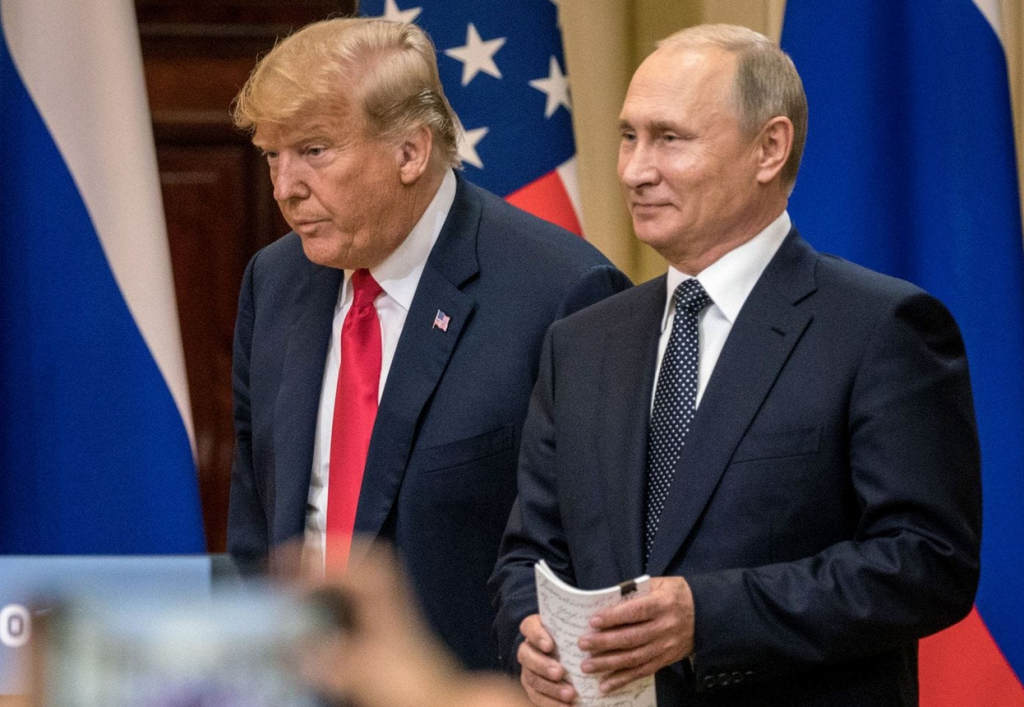Trump wants Russia to join the G-7. Here’s why that’s a terrible idea
Source: The Washington post / www.washingtonpost.com / By David J. Kramer /
David J. Kramer is a senior fellow in the Vaclav Havel Center for Human Rights & Diplomacy and director of European and Eurasian studies at Florida International University’s Steven J. Green School of International & Public Affairs.

For the second year in a row, President Trump is calling for welcoming Russia back into the club of the world’s leading industrial democracies. “I think it would be better to have Russia inside the tent than outside the tent,” Trump said at a news conference Monday at the end of the Group of Seven meeting in Biarritz, France, having already aired the idea before it.
His suggestion, to borrow a Danish phrase, is “absurd.”
Contrary to Trump’s claim that letting Russia back in would be “appropriate,” such a move would be completely contrary to U.S. national security interests. The other G-7 leaders, wisely, rejected any such overture to Moscow.
Over the weekend, European Council President Donald Tusk, a former Polish prime minister, stated it well: “When Russia was invited to G-7 for the first time, it was believed that it would pursue the path of liberal democracy, rule of law and human rights. Is there anyone among us who can say with full conviction, not out of business calculation, that Russia is on that path?”
The reason Russia was expelled from the then-Group of Eight in 2014 was because of Vladimir Putin’s invasion and illegal annexation of Ukraine’s Crimean Peninsula and the further Russian attacks against Ukraine in its Donbas region. It was not because Putin “outsmarted” then-President Barack Obama, as Trump has repeatedly alleged. G-7 leaders five years ago unanimously concluded that Putin’s flagrant violation of Ukraine’s sovereignty and territorial integrity warranted Russia’s expulsion from the exclusive club.
Unless and until Putin’s forces withdraw from eastern Ukraine and unless and until Russia returns Crimea to Ukrainian control, Russia does not merit any return to the G-8. Even then there are reasons to balk.
“Nothing has changed since March 2014, when Russia’s participation in the G8 was stopped,” Ukrainian President Volodymyr Zelensky stated after Trump voiced his idea last week. “Ukrainian Crimea is being occupied as before, Ukrainian Donbas is suffering from war.”
Indeed, Putin bears responsibility not only for violating Ukraine’s sovereignty and territorial integrity but also for the more than 13,000 killed in the fighting in the Donbas, along with the displacement of close to 2 million more. Putin also has the blood on his hands of 298 passengers killed after their Malaysia Airlines flight was shot down by a Russian missile in July 2014.
Putin denies Russian forces are fighting in Ukraine, much as he denies that Russia interfered in the 2016 U.S. presidential election or in any election in Europe. This, of course, is blatantly untrue, but it underscores the futility in taking Putin at his word. Thus, there is no point in having him join G-7 leaders to spin his lies in front of them.
There are, however, many other reasons Putin does not belong back in a G-8. He bears responsibility for the deaths of thousands of innocent Syrian civilians after his decision to send Russian forces to intervene there to prop up the murderous Bashar al-Assad regime. In violation of a 2008 cease-fire agreement, he maintains forces that occupy 20 percent of Georgian territory after Russian invaded that country.
He supports the Iranian regime and the Maduro regime in Venezuela. His government has been linked to an attempted coup in Montenegro to try to derail that country’s joining NATO. Russia has consistently broken U.N. sanctions on North Korea. Russian security services have been implicated in the use of radioactive material to poison Putin’s opponents such as Alexander Litvinenko in 2006 and Sergei Skripal in 2018 in Britain. Putin violates and abandons numerous treaties, including the Conventional Armed Forces in Europe treaty and the Intermediate-Range Nuclear Forces Treaty. He uses energy cutoffs to neighboring states as a weapon.
Putin seeks to destabilize his neighbors so they don’t become successful alternative models to the rotten system he oversees in Russia and to prevent them from integrating more closely, of their own choice, with the European Union and NATO. He threatens use of nuclear weapons and encourages his military to engage in reckless buzzing of NATO military aircraft and ships.
Recently, Putin has launched another ugly crackdown against those Russians who protest his rule. Putin’s minions murder opposition leaders such as Boris Nemtsov in 2015 and poison others such as Vladimir Kara-Murza (twice). They arrest, beat up and even kill journalists and civil society activists who challenge the regime and expose its corruption. They also harass American and other Western diplomats serving in Russia.
The West must ramp up pressure against the Putin regime until the costs of continuing such egregious behavior outweigh the benefits for the Kremlin; nothing else will work with Putin. We must also clean up our own house to block the import of Putin’s corruption.
There are certain issues — nuclear weapons and deconflicting military operations in Syria and elsewhere, for example — that require us to talk with our Russian counterparts. But this should not be done in a G-8 context. As long as Putin engages in the kind of unacceptable actions outlined above, no Western leader should be opening the G-8 door to him.

